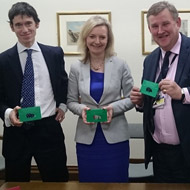Ministers discuss dramatic fall in hedgehogs

From left to right: Rory Stewart OBE MP, Liz Truss MP and Oliver Colville MP holding Hedgehog Highway plaques made from recycled plastic.
Ministers met in parliament this earlier week to discuss the declining fall in hedgehog numbers.
On Monday 1 February, Defra secretary Liz Trust met with the British Hedgehog Society (BHS) at the request of MP Oliver Colville.
They were joined by Defra minister Rory Stewart, Fay Vass from the British Hedgehog Preservation Society (BHPS), and Henry Johnson from People’s Trust for Endangered Species. (PTES).
They debated the importance of connectivity for hedgehogs at length, a message highlighted by the BHPS & PTES in their Hedgehog Street Project. Ministers appreciated what an important flagship species the hedgehog is and that measures to help them benefits other wildlife too.
The ministers also talked about replacing walls and fences were possible, and providing gaps in fences which aren’t replaced. Ideas for new builds, government input into raising awareness, and the possibility of a British Standard for fencing were also exchanged.
Delighted with the summit, Fay Vass from the BHPS commented: “We were very pleased that ministers took the subject so seriously and appear keen to help hedgehogs. We look forward to further discussions resulting in some positive actions to assist our prickly friends. We are very grateful to Oliver Colvile for giving us this wonderful opportunity.”
Oliver Colvile MP added: “Hedgehogs have declined over the last 15 years between by half in rural areas and by a third in urban ones. I’m keen that we stop further erosion of the population of this iconic species. It’s about sorting out their habitat”.
The BHPS now urge members of the public to join them in trying to reverse the serious decline in hedgehog numbers. For more information visit www.britishhedgehogs.org.uk.



 The Veterinary Medicines Directorate (VMD) is inviting applications from veterinary students to attend a one-week extramural studies (EMS) placement in July 2026.
The Veterinary Medicines Directorate (VMD) is inviting applications from veterinary students to attend a one-week extramural studies (EMS) placement in July 2026.